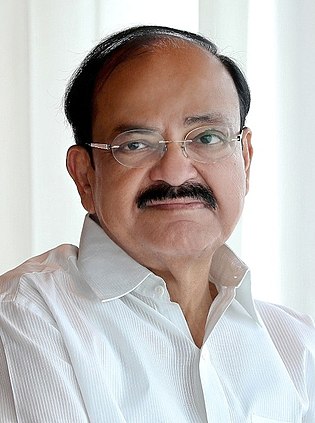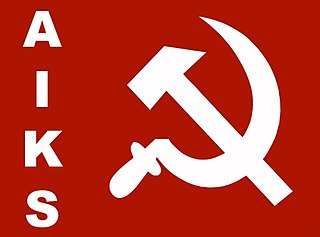
The Rajya Sabha, constitutionally the Council of States is the upper house of the bicameral Parliament of India. As of 2021 it has a maximum membership of 245, of which 233 are elected by the legislatures of the states and union territories using single transferable votes through Open Ballot while the President can appoint 12 members for their contributions to art, literature, science, and social services. The potential seating capacity of the Rajya Sabha is 250, according to article 80 of the Indian Constitution. Members sit for staggered terms lasting six years, with about a third of the 233 designates up for election every two years, in even-numbered years. The Rajya Sabha meets in continuous sessions, and unlike the Lok Sabha, being the lower house of the Parliament, the Rajya Sabha is not subjected to dissolution. However, the Rajya Sabha, like the Lok Sabha can be prorogued by the President.

The Lok Sabha, constitutionally the House of the People, is the lower house of India's bicameral Parliament, with the upper house being the Rajya Sabha. Members of the Lok Sabha are elected by an adult universal suffrage and a first-past-the-post system to represent their respective constituencies, and they hold their seats for five years or until the body is dissolved by the President on the advice of the council of ministers. The house meets in the Lok Sabha Chambers of the Sansad Bhavan, New Delhi.
In parliamentary procedure, a voice vote or acclamation is a voting method in deliberative assemblies in which a group vote is taken on a topic or motion by responding vocally.

The vice president of India, officially the vice president of the Republic of India, is the deputy to the head of state of India, the president of the republic. The Vice president is the second highest constitutional office after the president and ranks first in the presidential line of succession. The vice president is also an officer of the legislative branch of the Union Government as the chair of the Council of State.

The All India Kisan Sabha (AIKS), or All India Kisan Sabha , is the peasants front of Communist Party of India (Marxist), and works for farmers rights and anti-feudal movement in India.
India has a parliamentary system as defined by its constitution, with power distributed between the central government and the states.

The Speaker of the Lok Sabha is the presiding officer and the highest authority of the Lok Sabha, the lower house of the Parliament of India. The speaker is elected generally in the first meeting of the Lok Sabha following general elections. Serving for a term of five years, the speaker chosen from sitting members of the Lok Sabha.
A Member of the Legislative Assembly (MLA) is a representative elected by the voters of an electoral district (constituency) to the legislature of State government in the Indian system of government. From each constituency, the people elect one representative who then becomes a member of the Legislative Assembly (MLA). Each state has between seven and nine MLAs for every Member of Parliament (MP) that it has in the Lok Sabha, the lower house of India's bicameral parliament. There are also members in three unicameral legislatures in Union Territories: the Delhi Legislative Assembly, Jammu and Kashmir Legislative Assembly Puducherry Legislative Assembly. Only a Member of the Legislative Assembly can work as a minister for more than 6 months. If a non Member of the Legislative Assembly becomes a Chief Minister or a minister, he must become an MLA within 6 months to continue in job. Only a Member of the Legislative Assembly can become Speaker of the Legislature.
An Agricultural Produce Market Committee (APMC) is a marketing board established by state governments in India to ensure farmers are safeguarded from exploitation by large retailers, as well as ensuring the farm to retail price spread does not reach excessively high levels. APMCs are regulated by states through their adoption of a Agriculture Produce Marketing Regulation (APMR) Act.
The Deputy Speaker of the Lok Sabha is not subordinate to the speaker of Lok Sabha, they are responsible for the Lok Sabha and they are the second highest ranking legislative officer of the Lok Sabha, the lower house of the Parliament of India. They act as the presiding officer in case of leave or absence caused by death or illness of the Speaker of the Lok Sabha. It is by convention that position of Deputy Speaker is offered to opposition party in India.
This is a brief description of the lawmaking procedure in India.
Rajeev Shankarrao Satav was an Indian politician from the Indian National Congress. At the time of his death, he was the member of the Rajya Sabha the upper house of Indian Parliament from Maharashtra.

The Essential Commodities Act (ECA) is an act of the Parliament of India that was established to ensure the delivery of certain commodities or products, the supply of which, if obstructed due to hoarding or black marketing, would affect the normal life of the people. This includes foodstuff, drugs, fuel etc. This act was modified by the Essential Commodities (Amendment) Act, 2020 as part of the 2020 Indian farm reforms.

The Lokpal and Lokayuktas Act, 2013, commonly known as The Lokpal Act, is an anti-corruption Act of Indian Parliament in India which "seeks to provide for the establishment of the institution of Lokpal to inquire into allegations of corruption against certain important public functionaries including the Prime Minister, cabinet ministers, members of parliament, Group A officials of the Central Government and for matters connecting them".

The Rights of Transgender Persons Bill, 2014 is a proposed Act of the Parliament of India which seeks to end the discrimination faced by transgender people in India. The Bill was passed by the upper house Rajya Sabha on 24 April 2015. It was introduced in the lower house Lok Sabha on 26 February 2016.

The One Hundred and Third Amendment of the Constitution of India, officially known as the Constitution Act, 2019, introduces 10% reservation for Economically Weaker Sections (EWS) of society for admission to Central Government-run educational institutions and private educational institutions, and for employment in Central Government jobs. The Amendment does not make such reservations mandatory in State Government-run educational institutions or State Government jobs. However, some states have chosen to implement the 10% reservation for economically weaker sections.
The Transgender Persons Act, 2019 is an act of the Parliament of India with the objective to provide for protection of rights of transgender people, their welfare, and other related matters. The act was introduced in the Lok Sabha, the lower house of the Parliament, on 19 July 2019 by the Minister of Social Justice and Empowerment, Thawar Chand Gehlot, in light of the lapse of the Transgender Persons Bill, 2018. The 2019 act and the immediately preceding 2018 bill, were both preceded by a 2016 version. They were met with protests and criticism by transgender people, lawyers, and activists in India. The 2016 bill was sent to a standing committee which submitted its report in July 2017. Following this, the Lok Sabha tabled and passed a newer version of the bill in December 2018. However, it did not incorporate many of the committee's recommendations. Although members of the opposition criticised the 2019 act and assured transgender people that they would not vote in favour of it, it was passed by the Lok Sabha on 5 August 2019 and by the Rajya Sabha, the upper house of the Parliament, on 26 November 2019. The president assented to it on 5 December 2019, upon which the act was published in the Gazette of India. It has been in effect since 10 January 2020 following a notification of the same in the Gazette on the same day.

The 2022 Punjab Legislative Assembly elections will be held in Punjab on 20 February 2022 to elect the 117 members of the 16th Assembly of the Punjab Legislative Assembly. The votes will be counted and the results will be declared on 10 March 2022.
The Farmers' Produce Trade and Commerce Act, 2020 was an act of the Indian Government that permits intra-state and inter-state trade of farmers’ produce beyond the physical premises of Agricultural Produce Market Committee (APMC) market yards (mandis) and other markets notified under state APMC Acts.

The Indian agriculture acts of 2020, often termed the Farm Bills, are three acts initiated by the Parliament of India in September 2020. The Lok Sabha approved the bills on 17 September 2020 and the Rajya Sabha on 20 September 2020. The President of India, Ram Nath Kovind, gave his assent on 27 September 2020.






